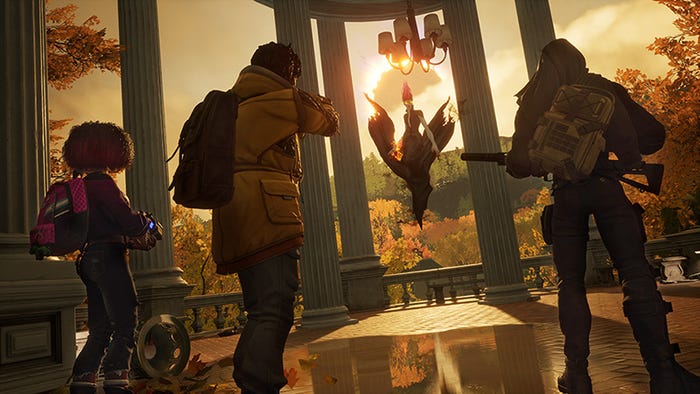
Featured Blog | This community-written post highlights the best of what the game industry has to offer. Read more like it on the Game Developer Blogs.
Roleplaying Games: An Alternate Reality
I grew up with RPGs as a default. Here are the reasons why I loved them as a whole and how quests immersed me enough to appreciate the games in the midst of passing decades.

From the very beginning when games were first introduced to me, I had always had a favoring for those that made me feel that a part of myself belonged to a different realm. From a perspective, it is in a way, escapism from the mundane. I remember myself getting immersed in storyline and character development.
It's also probably why at some point when these two aspects in gameplay began to decline that I joined RPG forums. There is only a handful of my real life acquaitances that have actually experienced that so I might as well enlighten you as to how the mechanics worked.
RPG forums functioned similarly to table-top games. The forum leaders would set up the realm, create categories that represent cities, forests, lakes and even continents. Before players could actually join, they had to construct their "in character" profiles. These included the background stories of their characters, their selection of spells, skills or feats limited to their character level (all start at level 1), their flaws whether those be physical or emotional etc. It will remind people of the regular character creation menus.
Sometimes they'd even have a fixed amount of base stats where you could distribute points to. It may all seem technical at first, but everything in the character sheet as we used to call it, directly affects world interaction. Sometimes it would be the players themselves who'd start quests, sometimes it would be game masters.
It's interesting how forum technology aids these writers. Often times, word-count is linked to experience points or gold. Experience points determine character levels if not the gold that they could spend within the "in character" store.
Gameplay-wise, the boards revolved around two things: combat and plot progression with the latter appealing more to an older generation of writers.
The mechanics remind me of how I grew up with RPG's. I find a certain appreciation for games that start me off with being an unknown character whose fate is to become a "somebody." I find immersion nailed right there. It's the very aspect that endears me to games such as Fable and movies such as Cinema Paradiso.
I like growing up with my character, building an identity for him or her from the ground up with a combat system secondary only to story. Simpler combat mechanics is probably my preference maybe because what drives me to pursue over a hundred hours of gameplay isn't what buttons I press to perform a combo move but the life path that my character can take.
Don't get me wrong. Linear storylines still work for me as it's a simulation to reading a book. However it also has a drawback. I as a gamer, have the tendency to disassociate myself from in-game immersion the moment that my character options become unrealistic to my real life personality. For me, it's like watching a film and telling myself at some point that "Hey! I wouldn't do that if I were that guy? I would have found an alternate solution instead."
Going back to RPG forums, every character was granted that free will to be ingenious with their decisions. They of course would be limited by their character profile sheet. Everything back then revolved around believability. A low dexterity character against a high dexterity rogue NPC was expected to act slower and more vulnerable. A character with no "knowledge wilderness" would act lost in a forest. A wannabe assassin with no stealth skill would create noise regardless but could find other methods to achieve surprise. Everything was based on ingenuity. Everything was based on a sense of free will.
I must say that Dragon Age Origins hooked me for that reason: a false sense of free will that still leads to the inevitable. It gives you a heroic feeling of accomplishment in some ways not achieved by others. I have to be honest that there were RPGs that made me feel that my character was a mere pawn, a messenger to deliver packages for NPCs. It's a feeling that I believe most role players avoid.
I have encountered games that had the hero perform long mundane quest threads as if he/she were a courier. On the other hand, I stumbled upon games that used the idea of giving out random quests as a tool to flesh out characters, to serve as foreshadowing for things to come, to serve as something to enrich the value of the environment and to fortify major plotlines.
It's like researching for a famous historical figure in Wikipedia. I remember myself reciting the lines: "oh so he's the dad of ______. No way! He fought this war too?" And it would be then that you'd find yourself hopping from one link to the other just so you could gather as much background as you can on a specific subject. Quests for me are like that. I find more value in them when they're more than just exp. or gold. They became memorable when they helped me understand the world my character stood in.
To sum it all up, in my opinion, RPGs become the most potent to its audience every single time it makes people disassociate from the reality of a regular guy playing on a computer. Everything follows from there: from the interface design and combat mechanics that mold themselves as flawlessly as possible to mass usability to immersion achieved by believability and the artificial simulation of real life choices.
Read more about:
Featured BlogsAbout the Author(s)
You May Also Like













